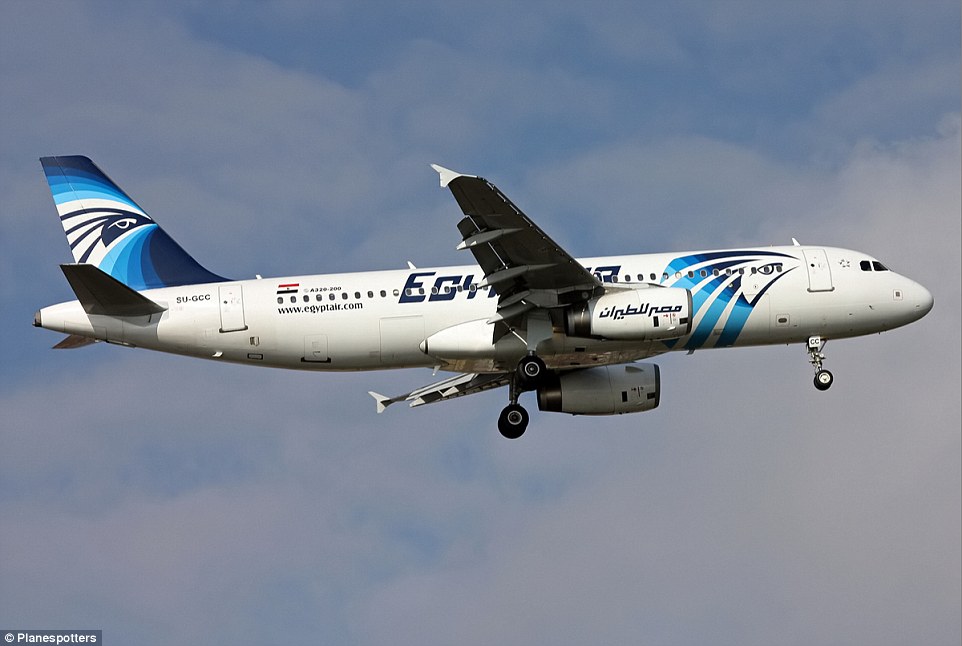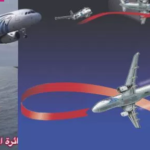An EgyptAir flight from Paris to Cairo that crashed into the Mediterranean Sea with 66 people on board was very likely brought down by a terror attack, experts said today.
The Airbus A320 left the French capital’s Charles De Gaulle Airport at 9.09pm GMT last night before coming down off the Greek island of Karpathos ten miles into Egyptian airspace at around 00.30am. Officials said there was no distress call.
There were 56 passengers on board including one Briton, 30 Egyptians, 15 French, one Belgian, one Iraqi, one Kuwaiti, one Saudi Arabian, one Chadian, one Portuguese, one Algerian and one Canadian. There were 10 crew on flight MS804 including three security guards.
Jean-Paul Troadec, the former chief of the BEA national investigation unit, said the lack of a live emergency alert suggested a ‘brutal event’.
He told Europe 1 radio station in Paris: ‘A technical problem, a fire or a failed motor do not cause an instant accident and the team has time to react.
‘The team said nothing, they did not react, so it was very probably a brutal event and we can certainly think about an attack.’
His comments came after a merchant ship captain reported seeing a ‘flame in the sky’ over the Mediterranean.
Lyzerakos told private Antenna television that controllers tried to make contact with the pilot 10 miles before the flight exited the Greek Flight Information Range (FIR), but the pilot did not respond.
Lyzerakos said controllers continued trying to contact the pilot until 0.39am GMT when the plane disappeared from the radar, around 10 miles into Egyptian airspace.
Egypt’s state-run newspaper Al-Ahram quoted an airport official as saying the pilot did not send a distress call and that last contact with the plane was made 10 minutes before it disappeared from radar.
EgyptAir said the plane sent an emergency signal, possibly from an emergency beacon attached to the plane, at 2.26am (GMT) two hours after it vanished.
In water crashes, an underwater beacon attached to the aircraft’s flight recorders starts to emit a signal or ping which helps search and rescue teams to locate the crash and find the black boxes.
A French security source told the Telegraph: ‘We cannot rule out the possibility of a terrorist attack.’
Egyptian military aircraft and navy ships were taking part in a search operation off Egypt’s Mediterranean coast to locate the debris of the plane, which was carrying 56 passengers, including one child and two babies, and 10 crew members.
Greece also joined the search and rescue operation, officials at the Hellenic National Defense General Staff said.

French Foreign Minister Jean-Marc Ayrault offered to send military planes and boats to join the Egyptian search for wreckage.
‘We are at the disposition of the Egyptian authorities with our military capacities, with our planes, our boats to help in the search for this plane,’ he said.
He spoke after French President Francois Hollande held an emergency meeting at the Elysee Palace.
Later, the French military said a Falcon surveillance jet monitoring the Mediterranean for migrants had been diverted to help search for the EgyptAir plane.
Military spokesman Colonel Gilles Jaron said the jet is joining the Egypt-led search effort and the French navy may send another plane and a ship to the zone.
Mr Hollande has spoken with Egyptian president Abdel-Fattah el-Sissi by telephone and they agreed to ‘closely cooperate to establish the circumstances’ in which the EgyptAir flight disappeared.
The government statement cited Hollande as saying he shares the anxiety of families.
Speaking on RTL radio, he said the Paris airport authority has opened a crisis centre to support the families coming to Charles de Gaulle Airport.
He said ‘no theory can be ruled out’.
Search and rescue teams have been sent to a specific location believed to be 40 miles from the Egyptian coast.
Greece has also joined the search and rescue operation.
Two aircraft, one C-130 and one early warning aircraft have been dispatched, officials at the Hellenic national defence general staff said.
They said one frigate was also heading to the area, and helicopters are on standby on the southern island of Karpathos for potential rescue or recovery operations.
Ahmed Abdel, the vice-chairman of EgyptAir holding company, said no distress signal had been sent, as far as he knew.
He added that there had been no reported problems with the plane when it left Paris.
The captain of the plane, Abdel said, had more than 6,000 flying hours. This includes 2,000 on an A320.
He also said there was no special cargo on board and the airline was not informed about any dangerous objects on board.
As the plane was in Egyptian airspace, their air traffic controllers should have been in contact with the flight team.
However, it does not necessarily mean the plane was over land at the time, as Egyptian air space stretches over the Mediterranean Sea.
According to flight schedules, it was the plane’s fifth flight of the day.
Shortly after news of the disappearance broke, the Egyptair website crashed.
The Airbus A320 is a short-to-mid range aircraft and is one of the most commonly used in the world that first entered circulation in 1986.
It has a capacity of 150 passengers and a range of more than 3,000 miles.
An EgyptAir plane was hijacked and diverted to Cyprus in March. A man who admitted to the hijacking and is described by Cypriot authorities as ‘psychologically unstable’ is in custody in Cyprus.
The incident renewed security concerns months after a Russian passenger plane was blown out of the sky over the Sinai Peninsula.
The Russian plane crashed in Sinai on October 31, killing all 224 people on board. Moscow said it was brought down by an explosive device, and a local branch of the extremist Islamic State group has claimed responsibility for planting it.
In 1999, EgyptAir Flight 1990 crashed into the Atlantic Ocean near the Massachusetts island of Nantucket, killing all 217 people aboard.
U.S. investigators filed a final report that concluded its co-pilot switched off the autopilot and pointed the Boeing 767 downward.
But Egyptian officials rejected the notion of suicide altogether, insisting some mechanical reason caused the crash.
@ DailyMail








